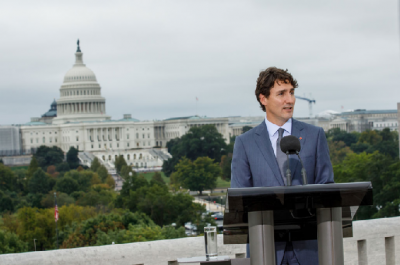Canada Loses UN Security Council Seat Bid

With only one round of voting, Canada lost its bid to secure a Security Council (UNSC) seat at the UN. (Wednesday, June 17, 2020). The result is what many domestic critics had hoped for, but in both foreign policy and domestic affairs it changes little – obviously, Canada remains off the UNSC and will continue with its usual policies for the future.
EKOS poll
A recent poll/news release by EKOS Research came out the day before as an interesting prelude to the vote (see this). The poll was sponsored by Canadians for Justice and Peace in the Middle East (CJPME) Independent Jewish Voices (IJV) and the United Network for Justice and Peace in Palestine and Israel (UNJPPI – United Church). The release covered two main topics: the proposed annexation of Palestinian West Bank territory by the Netanyahu-Gantz coalition government of Israel; and perspectives on increasing or decreasing Canada’s influence on several international concerns.
Annexation
On the first topic, the annexation of Palestinian territory, the Canadian Liberal government of Justin Trudeau (and all the other party leaders) is out of touch with the Canadian voters sentiment,
“The results show that 74% of Canadians want the government to express opposition to Israeli annexation in some form, and 42% of Canadians want to impose economic and/or diplomatic sanctions against Israel.”
The Canadian government has so far not done so. To put this back in with the UNSC comments, Canada indicated it would be a strong supporter of Israel on the UNSC and in the past has clearly sided with U.S./Israeli interests over the rights of the Palestinian people. Canada’s voice on the UNSC would primarily be an “asset for Israel” (Chrystia Freeland, Deputy Prime Minister) and would generally follow U.S. foreign policy initiatives in most areas. Canada – all political parties – still support the two state solution as negotiated between partners, an outdated and never possible course of action.
Canada’s foreign affairs
Taken more broadly, while Canadians are generally against annexation of Palestinian territory, they are much more indecisive about other aspects of Canada’s foreign policy.
A clear majority do want more action on climate change, and while Canada boasted about its climate change initiatives abroad, its progress at home is less than stellar, as it has invested heavily in Alberta tar sands extraction and transport. Rather than advise other countries about climate initiatives, Canada needs to address its own abysmal standards first. On two other topics the results were mixed. Both Canada’s role as a peacekeeper and Canada’s foreign aid dollars brought mixed support.
Peacekeeping, not so much
In truth, most people in Canada understand Canada’s peacekeeping role as expressed through the mainstream media (MSM) as being a benevolent force for good. They do not understand clearly Canada’s role in dismembering Yugoslavia, the coup in Haiti against Jean Bertrand Atristide, the destruction of Libya well beyond the official UN mandated no fly zone, the feeble anti-ISIS effort in conjunction with the U.S. combined with its regime change dogma about Syria, the offensive role in Afghanistan against the native Taliban, the sale of military hardware to Saudi Arabia for its U.S. sponsored war in Yemen, and other areas of international distress largely associated with U.S. foreign policy and its drive towards hegemony. This misunderstanding stems largely from the MSM not accurately depicting Canada’s role, and Canada’s politicians continually rallying the flag around the Canadian military in its adjunct role as supporting U.S. foreign policy.
While listening to Canada’s Minister of Foreign Affairs, François-Philippe Champagne, after the vote, he at best offered the same old platitudes always offered by Canada, including the tired canard about ‘rule of law’ – rules of law that Canada itself does not follow in particular with the initial focus of discussion on Israel. Israel’s transgressions of international law and humanitarian law throughout its military occupation of Palestine are seldom if ever discussed or debated.
Along with other subjects Champagne talked about “engaging with Venezuela” – indeed! Calling for regime change, supporting a U.S. sponsored pretender to power, and essentially organizing the Lima group to oppose Venezuela can hardly be considered following any rule based international order (I wonder how many of them voted for Canada!).
It follows that the world is smart enough, informed enough, in order to deny Canada its desired UNSC seat. Both Norway and Ireland have much stronger views on Palestinian rights, and while this may not have been the deciding factor, it certainly would have played an informed role in the decision.
Future expectations
The result of the vote is rather anti-climactic as not much change can be foreseen regarding Canada’s foreign policies in general and in Canada’s policies vis a vis Israel. Trudeau’s Liberals could express opposition to Israeli annexation, and in light of this poll, may well do so mainly to placate the domestic voter, but don’t expect much to change behind the scenes with Canadian and Israeli interactions on security and military affairs in the region and domestically.
*
Note to readers: please click the share buttons above or below. Forward this article to your email lists. Crosspost on your blog site, internet forums. etc.

